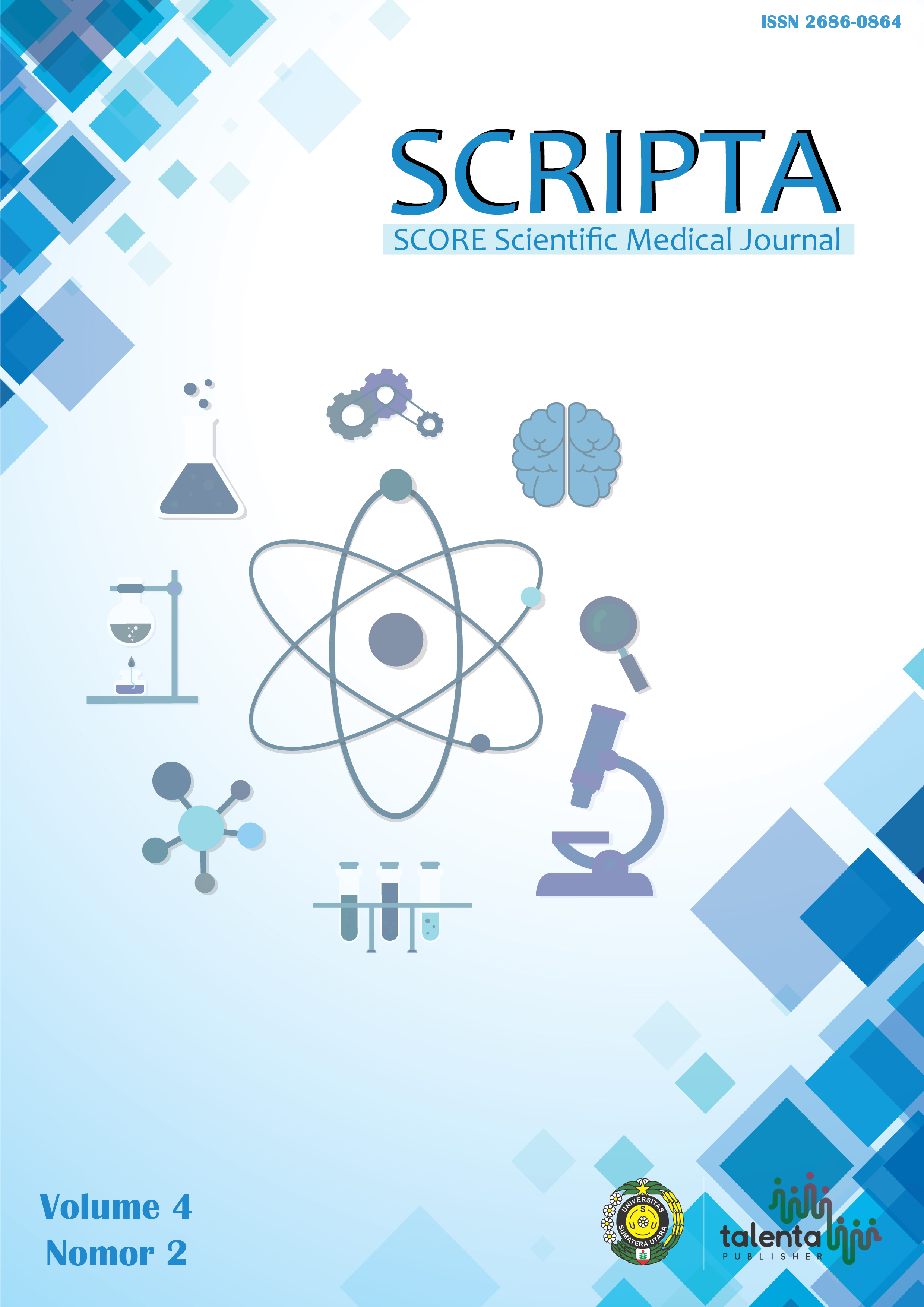Profile of Breast Cancer Patients on Estrogen Receptor Expression in RSUD. Dr. Pirngadi Medan 2018-2019
DOI:
https://doi.org/10.32734/scripta.v4i2.10520Keywords:
breast cancer, estrogen receptor, histopathology type, immunohistochemistry, metastases, derajat keganasan, gambaran histopatologi, immunohistokimia, kanker payudara, reseptor estrogenAbstract
Background: Breast cancer is a type of cancer with the highest incidence and become the leading cause of death in the world. The incidence rate continues to increase due to various risk factors such as endogenous and exogenous. Immunohistochemical examinations is useful to determine therapy and patient's prognosis. Objectives: This study aims to determine how the profile of breast cancer patients on the expression of estrogen receptor in RSUD. Dr. Pirngadi Medan 2018-2019. Methods: This is descriptive cross-sectional research using random-sampling technique. Data were obtained secondary from medical records of breast cancer patients in hospitals. Dr. Pirngadi Medan 2018-2019. Results: From 250 cases, 71 samples were taken in this study. Of the 71 samples, most of the patients were in the 46-55 year old group with negative ER with 18 people (58.1%), 13 people (56.5%) patients had tumor size T4 with positive ER, most of the patients did not have nodular metastases, distant metastases, family history and use of hormones with negative ER with 26 people (63.4%), 39 people (66.1%), 36 people (60%) and 42 people (62.7%), respectively (66.7%) patients had obese with negative ER, invasive ductal histopathology type with negative ER was mostly found in 41 people (63.1%) and the most histopathological grading was in grade 2 with negative ER with 26 people (57.8%). Conclusion: Â Almost all patients based on the characteristics of the majority of breast cancer have negative ER, except patients with T4 tumor size have positive ER.
Keywords: breast cancer, estrogen receptor, histopathology type, immunohistochemistry, metastasesÂ
Latar Belakang: Kanker payudara merupakan jenis kanker dengan angka kejadian tertinggi dan menjadi penyebab utama kematian di dunia. Angka kejadian tersebut terus meningkat disebabkan oleh berbagai faktor risiko seperti faktor endogen maupun eksogen. Pemeriksaan imunohistokimia seperti reseptor estrogen berguna untuk menentukan terapi dan prognosis pasien. Tujuan: Penelitian ini bertujuan untuk mengetahui bagaimana profil pasien kanker payudara terhadap ekspresi protein reseptor estrogen di RSUD. Dr. Pirngadi Medan Tahun 2018-2019. Metode: Penelitian yang dilakukan adalah penelitian deskriptif observasional menggunakan desain cross sectional dengan teknik pengambilan sampel random sampling. Data diperoleh secara sekunder dari rekam medis pasien kanker payudara di RSUD. Dr. Pirngadi Medan Tahun 2018-2019. Hasil: Dari 250 kasus kanker payudara periode 2018-2019, diambil sampel sebanyak 71 buah rekam medis. Dari 71 sampel, sebagian besar pasien terjadi pada kelompok usia 46-55 tahun dengan ER negatif sebanyak 18 orang (58.1%), sebanyak 13 orang (56.5%) pasien memiliki ukuran tumor T4 dengan ER positif, sebagian besar pasien tidak mengalami metastasis pembuluh limfe, metastasis jauh, tidak memiliki riwayat keluarga dan penggunaan hormon dengan ER negatif dengan masing-masing sebanyak 26 orang (63.4%), 39 orang (66.1%), 36 orang (60%) dan 42 orang (62.7%), sebanyak 20 orang (66.7%) pasien memiliki IMT obesitas dengan ER negatif, tipe histopatologi duktal invasif dengan ER negatif paling banyak ditemukan sebanyak 41 orang (63.1%) dan derajat histopatologi terbanyak pada derajat 2 dengan ER negatif sebanyak 26 orang (57.8%). Kesimpulan: Hampir keseluruhan pasien berdasarkan karakteristik kanker payudara mayoritas memiliki ER negatif, kecuali pasien ukuran tumor T4 memiliki ER positif.
Kata Kunci: derajat keganasan, gambaran histopatologi, imunohistokimia, kanker payudara, reseptor estrogen
Downloads
Downloads
Published
How to Cite
Issue
Section
License
Copyright (c) 2023 naomilaksita, Pimpin Utama Pohan

This work is licensed under a Creative Commons Attribution-ShareAlike 4.0 International License.
Authors who publish with SCRIPTA SCORE Scientific Medical Journal agree to the following terms:
- Authors retain copyright and grant SCRIPTA SCORE Scientific Medical Journal right of first publication with the work simultaneously licensed under a Creative Commons Attribution-NonCommercial License that allows others to remix, adapt, build upon the work non-commercially with an acknowledgment of the work’s authorship and initial publication in SCRIPTA SCORE Scientific Medical Journal.
- Authors are permitted to copy and redistribute the journal's published version of the work non-commercially (e.g., post it to an institutional repository or publish it in a book), with an acknowledgment of its initial publication in SCRIPTA SCORE Scientific Medical Journal.














